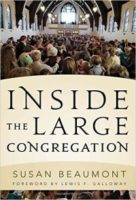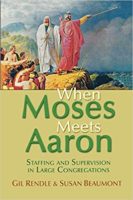
Many are turning to planning now, trying to coax order out of the chaos. It would be lovely if planning resolved liminality. It doesn’t.
Plans create an artificial sense of control, but they cannot resolve the deep disorientation of a liminal season—a season in which something has ended but a new thing is not yet ready to begin. In fact, the wrong plan will distract you from the innovation needed to thrive in the next chapter.
The Fundamental Problem
Traditional planning methods work as follows. You describe the current state of things. Envision a preferred future. Determine the size of the gap between the current state and the desired future state. Create an action plan to close the gap. It’s a linear approach to the management of time and resources. Start at point A and move to point B.
Learning in a liminal season isn’t linear. It is cyclical. We revisit the same themes and challenges over and over, each time from a slightly different vantage point. We learn things. We unlearn things. We relearn what we thought we had already mastered.
You shouldn’t be designing a linear plan to guide a cyclical learning process.
Another fundamental problem with our planning processes is the reliance on the past to predict the future. Often, our description of the current state rests on unstated assumptions that may no longer hold true. For example:
- Corporate worship on campus forms the centerpiece of congregational life.
- The best evaluators of health and vitality are worship attendance, membership, and operating budget.
- Membership is central to discipleship.
We stand on the precipice of a future that will behave significantly different from the past.
We don’t have a clear picture of our present reality. It fluctuates daily. We are on the other side of the pandemic, except that we are not. People are settling into their new worship patterns, except that they are not.
Furthermore, we don’t yet have the language to describe a desired future state. What will success look like now? Who can say?
A Habit We Need to Break
When most of my clients talk about an upcoming learning season, they list a survey of the congregation as one of the primary activities they want to engage. Let’s do a survey to assess the needs and preferences of the existing congregation.
The problem with using surveys now is that they are designed to evaluate the past: existing programs, existing leadership, existing needs. They are also designed to measure satisfaction. And the implicit assumption is that any plans you generate will address areas of dissatisfaction. If the plan doesn’t do that, people feel that you’ve been disingenuous with them.
The satisfaction of our constituents should not be the primary driver of our learning agenda. Ask the average person sitting in the pew what needs to happen next, and you are likely to get a “deer in the headlights” response. Most congregants have no clue what needs to happen next to prepare the church for its future. You may elicit responses that describe their preferences for restoring an equilibrium. You are not likely to get any meaningful response about the future direction of the church.
What You Should Do Instead
Don’t misunderstand me. Of course, leaders need to keep a pulse on the interests, passions, and preferences of their constituent groups. If leaders get too far out in front of the people, no one will follow. However, determining constituent preferences is not the appropriate place to begin innovating.
Innovation begins with naming the driving questions that will shape the next season of ministry.
Driving questions name the real-world adaptive challenges your congregation is facing. A driving question is not currently answerable. It is a compelling question that, once answered, will significantly alter the way you approach ministry. Because the answer is not presently knowable, the organization must learn from the future as it emerges. This requires experimentation, iteration, and intentional reflection on lessons learned.
Here are several examples of driving questions that may or may not be applicable to your context:
- What is the future of our campus now that ministry isn’t limited by geography or defined by place?
- What is the meaning of church membership for those who don’t engage the church through its campus?
- What does discipleship look like in an era when people are no longer interested in attending programs?
When you are forming your driving questions, avoid using “How do we…?” language. The word “how” may tempt you to design technical solutions to problems that are still unsolvable. Avoid questions like, “How do we grow the church? How do we get people to come back to worship? How do we get people to disciple their own children?”
If you lose yourself in technical problem solving, you will distract yourself from adaptive learning. Instead, take a step back and name the deeper adaptive challenges that lie behind the problem you feel tempted to solve.
Design Experiments to Learn More
Once you have identified your driving questions, design a set of experiments that will help you learn something about one or more of your driving questions.
Effective experiments are not meant to solve anything. They are meant to help you learn about your driving questions. In fact, you should avoid taking on any experiment that presumes to solve or bring resolution to a driving question. An effective experiment will:
- Distinguish technical problem solving from adaptive learning
- Surface or engage conflict surrounding a driving question
- Take a systemic approach, not an individual focus
- Encourage appropriate risk taking
- Facilitate learning
- Involve testing hypotheses or unstated assumptions
- Explore contrary or conflicting data
- Require mid-course corrections as you generate new knowledge
As you engage in your experiments, create an intentional process for reflecting on results, processing failure, iterating your approach, and trying again.
Eventually, the chaos of a liminal season will resolve itself. It is the essential nature of the Universe for order to arise out of chaos. Our job as leaders is to participate in the process of unfolding, to be led by the future itself until eventually a new coherence emerges—one that points the way to a more plannable future.
Susan Beaumont is a coach, educator, and consultant who has worked with hundreds of faith communities across the United States and Canada. Susan is known for working at the intersection of organizational health and spiritual vitality. She specializes in large church dynamics, staff team health, board development, and leadership during seasons of transition.
With both an M.B.A. and an M.Div., Susan blends business acumen with spiritual practice. She moves naturally between decision-making and discernment, connecting the soul of the leader with the soul of the institution. You can read more about her ministry at susanbeaumont.com.



